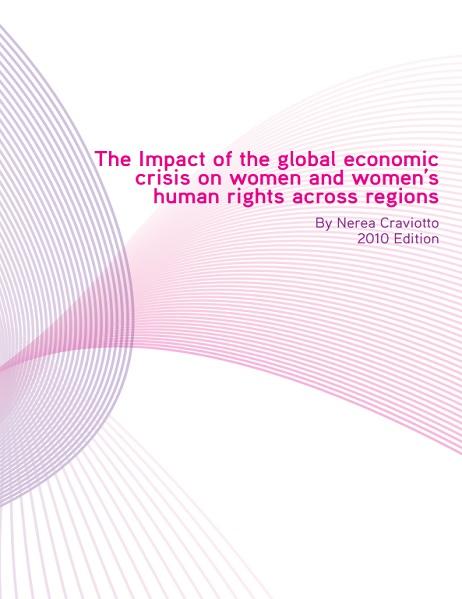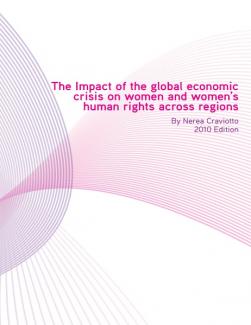
Women are at the centre of the fallout from the systemic crisis, which combines distinct interlocked crises: a global economic recession, the devastating effects of climate change, and a deepening food and energy crisis. This series presents different sub-regional perspectives on the impacts of this global crisis on women’s rights.
These briefs provide data, testimonies, and voices from women activists on the ground. Each case presents an opportunity to unpack the in-depth challenges faced by different women in diverse contexts while examining possible policy solutions from a feminist perspective. This work takes us on a journey to help us think beyond the financial crisis and its implications, and start reflecting about the new world being created. At AWID we believe these case studies contribute to building and supporting women’s movements.
This systemic crisis is now a driving force behind many policy choices and processes at all levels (from the local to the global). In a context where most of the responses to the crisis are gender-blind, women’s rights and gender equality must not be further overlooked. This is not simply because women are particularly affected by the crisis, but also because they are key development players in most communities around the world.
Women are relevant and vital actors in proposing effective approaches to mitigate the impacts of the crisis, promote empowerment strategies, and ensure the fulfilment of human rights, including environmental, economic, social, and cultural rights.
The development model promoted in the past decades is clearly in crisis and women’s groups have experiences, lessons learned, and expertise that can contribute to promote a more equitable, inclusive, sustainable, and democratic development model.
It is in that spirit that the authors of these briefs accepted the challenge to explore answers to the following questions:
- Considering the diversity of situations in which women live, what are the main challenges for women in your sub-region in the context of the current crisis?
- Can you identify concrete actions or initiatives (responses to the crisis) that have already had either negative and/or positive impacts on women’s lives?
- Are women’s groups in your region experiencing increased discrimination as a direct or indirect result of the financial crisis?
- If stimulus packages are not inclusive of human rights and gender equality perspectives then are there any alternatives so that these packages are reshaped in order to include gender and rights dimensions?
- If the governments of the region/sub region (or regional bodies) have not set up any stimulus packages or measures yet: what do you expect will be the impact of not tackling the crisis in a timely way at the national and regional level?
- What are potential future impacts on women in your region in the context of a global recession? Which are the most outstanding weaknesses of the region in regards to the economic crisis?
- The UN Stiglitz Commission and the G20 are trying to identify international initiatives to reduce the impact of the crisis on development. Do you think these global initiatives consider challenges confronted by women, and how to help women in your region face the crisis?
Download the series of briefs below:
The Impact of the Crisis on Women in Latin America
By Alma Espino and Norma Sanchís
This brief paper analyzes the signs of recovery in several countries in the Latin American region while pointing out the gaps in the formal labor market indicators that evidence the unequal economic prospects for women. The authors stress the need for public policy measures to facilitate work and family life for men and women, particularly among the population living in poverty that is overwhelmingly represented by children and single parent households.
Impact of the Global Crisis on Women in Developing Asia
By Jayati Ghosh
Policy-makers in Asia tend to see the global recession as a mere blip in a process of continuing and dynamic economic growth. However, as this brief explores, the crisis has had a significant impact on women in many Asian countries in terms of their varied but overlapping roles as paid workers, self-employed workers, unpaid workers, members of households, and citizens with rights and individuals with needs, wants and aspirations.
The Impact of the Crisis on Pacific Island Women: A Snapshot
By Karanina Sumeo
The author of this brief examines how the global economic crisis has exacerbated some of the shared struggles for women in the Pacific region, but has also prompted a rethink of traditional attitudes that have hindered women’s voices and efforts to better themselves, their communities, their nations, and the Pacific region as a whole.
Impacts of the Global Economic and Financial Crisis on Women in Central Asia
By Nurgul Djanaeva
The negative trends of the global economic and financial crisis remained in Central Asia throughout 2010. The impacts of the crisis on women including rising unemployment, migration, wage discrimination or lack of basic social protection in the female-intensive garment industry have not been addressed by governments in the region.
The Impact of the Deepening Economic Crisis on Women and Gender Equality in Western Europe
By Wendy Harcourt and Lois Woestman
This updated edition expands the original analysis through an in-depth case study on Greece and a series of interviews with women rights activists from around Europe The paper also discusses further trends with a feminist perspective such as the growing divide between North and South Europe, the lack of trust in the EU, increased racism and difficulties for migrants around fears of social unrest.
The Impact of the Crisis on Women in Eastern Europe
By Ewa Charkiewicz
In all countries in Eastern Europe, poverty is highest among children and youth. Young women and men are the hardest hit due to the privatization of education, housing, and flexibilization of labor markets. A new category of the working poor has emerged: those barely surviving and with no chance of accumulating savings for future pensions.
The Global Economic Crisis and Gender Relations: The Greek Case
By Lois Woestman
The Greek case shows that the economic crises and its attendant “recovery programmes” within the eurozone are hitting both men and women hard, but in gender differentiated ways. They are also causing crises in the largely invisible unpaid care economy, where women bear the brunt of the unpaid work burden.
The Impact of the Crisis on Women in the United States: The Continued Need for Social Sector Stimulus
By Rania Antonopoulos and Taun Toay
While the recent crisis in the United States has been characterized as a “man-cession,” such analysis discounts the important impacts on women and families. The effect on these groups is particularly crucial given the “invisible” space that a large degree of female labor occupies. Government responses thus far have largely favored male job retention and creation. In light of these considerations, the authors propose direct job creation and female-targeted transfer payments to help ease the impact of these crises on groups that are falling largely outside of the response efforts to date.
The Impact of the Deepening Economic Crisis on Women in Eastern and Southern Africa
By Zo Randriamaro
The potential impact on women in the context of the economic recovery, hinges on the policy space and commitment of African governments to address the structural weaknesses of their economies, which existed even before the global systemic crisis and hindered the potential of growth to create more equitable societies. Most importantly, the impact will also depend on the governments’ political will to decisively address the structural gender inequalities that continue to exclude too many women from the benefits of growth.
The Impact of the Global Economic Crisis on Women and Women’s Human Rights Across Regions
By Nerea Craviotto
In order to develop responses to the crisis that are grounded in the lived experiences of women affected by the crisis across the globe, this cross-regional update highlights the impacts across and within regions. Almost 3 years into the current systemic crisis, the disproportionate impact on particular women, the intense challenges women face in maintaining livelihoods and the erosion of women’s human rights continue.
Women’s economic empowerment in the Arab region
By Kinda Mohamadieh
The global crises has contributed to exacerbating an already deteriorated context in the Arab region which is marked by political repression, lack of democracy, economic and social marginalization, and human rights violations. Within this context, this brief highlights the gender gaps and employment disparities in Arab countries, and it examines how chronic development challenges and the global crises triggered people’s revolutions with women at the centre of the revolutions and uprisings witnessed in the Arab region since the end of 2010.
The Impact of the Crisis on Women in the Caribbean
By Rhoda Reddock y Juliana S. Foster
The global financial crisis received world-wide attention in mid-2008, amidst signs of increasing distress. The authors of this brief address the impact of the global financial crisis in the context of the Caribbean.
The Global Financial Crisis and Women in West Africa: Developing Impacts and the Implications of Policy Responses
By Dzodzi Tsikata
Due to different aspects of the African continent’s economic relationships with the various regions of the world as well as the generalised climate of insecurity generated by the global financial crisis, the global financial crisis has spread to sub-Saharan Africa. The author of this brief examines how the current and potential impacts of the global financial crisis needs to be understood within an already difficult West African context.
The Impact of the Crisis on Women: Main Trends across Regions
By Natalie Raaber
The authors of this brief present the main trends emerging from a cross–regional analysis of the impact of the crisis on women’s rights. Both the similarities and the differences across regions are drawn out.
